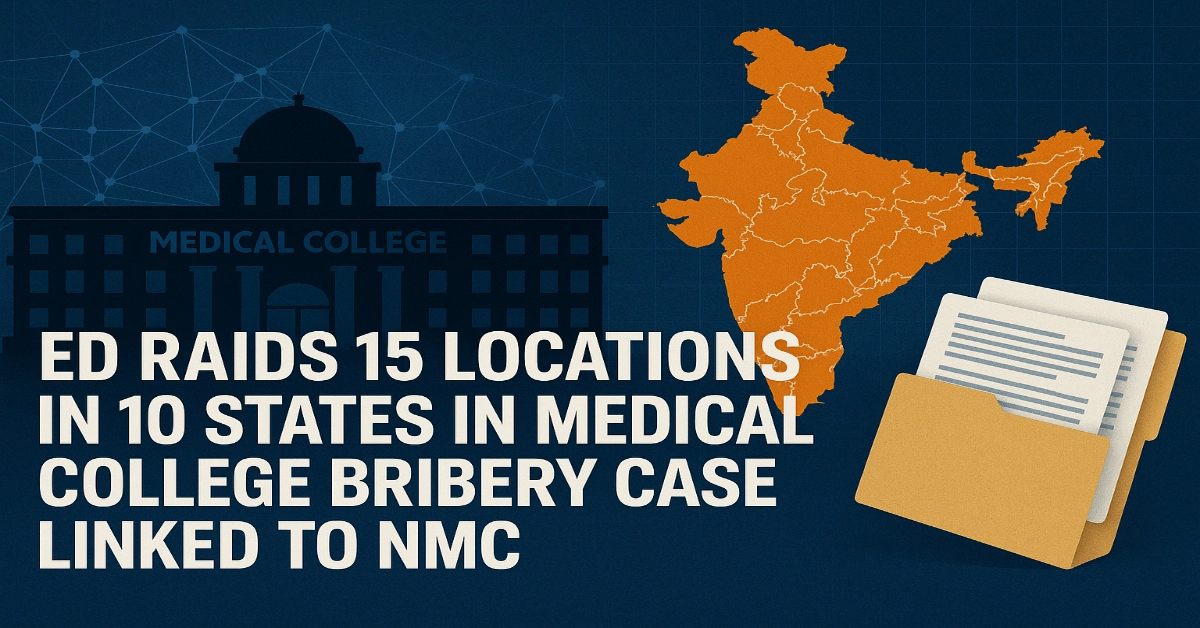NMC Leak Case: The Enforcement Directorate (ED) carried out extensive search operations across 15 locations in 10 states. The raids are connected to an alleged bribery and corruption network involving medical colleges, intermediaries, and senior government officials, including those associated with the National Medical Commission (NMC).
These states are Andhra Pradesh, Telangana, Maharashtra, Madhya Pradesh, Chhattisgarh, Gujarat, Rajasthan, Bihar, Uttar Pradesh, and Delhi.
According to official sources, these search operations are linked to an FIR filed by the Central Bureau of Investigation (CBI).
CBI FIR Sparks Multi-Agency Crackdown
The CBI FIR alleges a deep-rooted bribery network in which confidential inspection-related data from the NMC was illegally shared with key personnel of medical colleges and middlemen.
The alleged purpose was:
- To manipulate inspection parameters
- To acquire mandatory approvals to run medical courses
- To bypass deficiencies that would ordinarily lead to the denial of course permissions
This corruption, if proven, exposes one of the most serious breaches in the governance of medical education in India.
What the ED Is Investigating
Officials familiar with the inquiry stated that the ED aims to uncover the money trail behind the alleged bribery scheme.
The focus areas of the ED investigation include:
- Flow of illicit funds between medical colleges, intermediaries, and government officials
- Financial irregularities were detected in institutional and personal accounts
- Assets acquired through alleged unlawful practices
- Communication trails showing the exchange of confidential inspection details
Seven of the searched premises belong to medical colleges across different states. In addition, raids are underway on the residences and offices of private individuals named in the CBI FIR, who allegedly coordinated bribes and facilitated the illegal transfer of sensitive regulatory information.
How the Bribery Scheme Allegedly Worked
According to preliminary findings:
- Medical colleges seeking approval for courses or renewal of permissions allegedly contacted intermediaries.
- These intermediaries approached government officials, including some linked to the NMC.
- In exchange for financial kickbacks, officials allegedly leaked:
- Upcoming inspection schedules
- Expected deficiency reports
- Internal evaluation guidelines
- With such information, certain institutions were able to prepare or manipulate conditions ahead of inspections.
- This allowed them to secure approvals that they may not have been qualified for under standard regulatory norms.
This alleged systematic compromise not only weakens regulatory integrity but also raises serious concerns about the quality of medical education being delivered by these institutions.
Regulatory Integrity Under Question
The alleged scandal highlights longstanding vulnerabilities in the medical college approval ecosystem, which has historically faced criticism for:
- Opaque inspections
- Potential conflicts of interest
- Middlemen-driven approval processes
- Limited transparency in NMC–college interactions
A breach of this scale threatens the credibility of the NMC and could undermine public trust in India’s medical education regulatory framework.
Experts warn that if such approvals were indeed granted based on manipulated inspections, the competence of future medical practitioners trained under compromised systems may also be at risk.
Why the Case Concerns for India’s Medical Education Sector
India has seen a rapid expansion of medical colleges in recent years, particularly private institutions. Approvals for new MBBS seats, PG seats, and new medical colleges have increased significantly.
With this expansion, regulatory vigilance becomes critical.
This case serves as a stark reminder of the systemic challenges:
- Are regulatory inspections sufficiently independent?
- Is there a robust mechanism to prevent insider leaks?
- Can approvals be influenced through unofficial channels?
- Are audits of medical colleges thorough and tamper-proof?
The current ED and CBI investigations could trigger long-term reforms in the NMC’s process of granting:
- Letter of Permission (LoP)
- Renewal of permission (RoP)
- Seat enhancements
- PG course approvals
Searches Indicate Wide Network of Accused Individuals
Officials confirmed that the searches involve not just institutions but also individuals directly implicated in the CBI FIR. These include:
- College administrators
- Middlemen
- Facilitators who allegedly channelled bribes
- Officials suspected of leaking confidential data
The ED is expected to scrutinise:
- Bank transactions
- Property documents
- Digital records
- Communication logs
- Any unexplained income or disproportionate assets
The agency believes that uncovering the financial linkages will help expose the full extent of the alleged bribery network.
Part of a Larger Crackdown on Corruption in Medical Education
The ED action is being viewed as part of a broader crackdown by the central government on corruption in the medical education sector.
In recent years, authorities have increasingly focused on:
- Misuse of funds by medical colleges
- Fraudulent admissions
- Seat-blocking rackets
- Capitation fee channels
- Manipulation of compliance reports
- Irregularities in college inspections
The present case could be one of the largest multi-state investigations involving medical institutions in recent years.
What Happens Next?
The ED is expected to continue examining:
- Money laundering aspects under the Prevention of Money Laundering Act (PMLA)
- Connections between individuals and institutions named in the FIR
- Financial beneficiaries of the alleged bribery racket
If evidence supports the allegations, the case could lead to:
- Arrests of key players
- Suspension or blacklisting of the involved medical colleges
- Scrutiny of approvals issued in the past few years
- A possible reevaluation of NMC inspection mechanisms
The results of this investigation may also set the stage for policy reforms aimed at making inspections more transparent, tamper-proof, and independent.
The ED’s sweeping searches across 10 states mark a significant escalation in the probe into alleged corruption within India’s medical college approval process. The investigation has the potential to reshape how medical education is regulated and how institutions are monitored.
As authorities dig deeper into financial records and communication trails, more revelations are expected, which may uncover a deeply entrenched network operating at the intersection of private education and public administration.
This case could very well become a turning point in restoring accountability and trust within India’s rapidly expanding medical education ecosystem.

